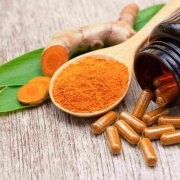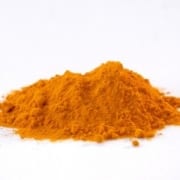Cognitive Benefits of Curcumin
The daily consumption of curcumin, the active compound in turmeric, can have significant benefits on cognitive health.
According to the National Institutes of Health (NIH), more than 88 million Americans over the age of 65 will be diagnosed with neurodegenerative disease by 2050. The progression of neurodegeneration has been associated with the imbalance between the level of antioxidants and the increased oxidative damage by free radicals to proteins, DNA, and lipids.
Curcumin is a chemical compound found in plants, with anti-bacterial, anti-inflammatory, anti-proliferative, and antioxidant properties. Research has seen an astounding success proving the benefits of curcumin as an antioxidant and anti-inflammatory, with over 7000 articles published in the last two decades. Its neuroprotective properties help prevent free radical damage and calms the inflammatory process at the root of many chronic diseases. Studies have shown it to be effective against many gastrointestinal diseases and metabolic diseases such as diabetes and obesity, certain cancers, cardiovascular disease, and neurodegenerative diseases such as Alzheimer’s. In fact, curcumin has long been suspected to be the reason behind the low rates of Alzheimer’s disease in India, where turmeric spice is widely and frequently used in curry meal preparation.
However, curcumin is unique in that it is not easily absorbed by the body on its own. In order to increase its bioavailability, it must be paired with other compounds, one such example is piperine, a compound found in black pepper.
But for those who don’t have a taste for this beautiful golden spice, supplementation can be key. Research on the supplement Theracurmin* a bioavailable (more easily absorbed by the body) form of curcumin, has shown it contains significantly higher plasma concentration of curcumin than other leading brands of supplements. Clinical studies have also shown it to have benefits in osteoarthritis, muscle fatigue after exercise, and clearing alcohol metabolites. There are on-going clinical trials investigating the effects of Theracurmin on other inflammatory diseases.
A 2019 study on curcumin, led by Dr. Gary Small, director of geriatric psychiatry at UCLA’s Longevity Center, was conducted over an 18 month period and included 40 adults that ranged in age from 51 to 84. Twenty-one randomly selected participants were given twice daily doses of Theracurmin, and the remaining 19 participants were given a placebo. Cognitive assessments were taken every 6 months and curcumin levels were measured at both the start and end of the study. In addition, 30 participants (15 placebo & 15 curcumin) underwent PET scans to measure levels of the proteins amyloid and tau in their brains both at the start of the study and after 18 months. These two proteins are targeted because of their association with neurodegenerative disorders; when accumulated in the brain, they are thought to contribute to the breakdown of neurons which can potentially lead to symptoms of Alzheimer’s disease.
At the end of the study, researchers concluded that the daily intake of Theracurmin resulted in “improved memory performance and attention in non-demented adults.” Based on the PET findings, the study further concluded that “behavioral and cognitive benefits are associated with decreases in plaque and tangle accumulation in brain regions modulating mood and memory.”
While this study was quite small, the results are indeed promising and warrant continued research. Supplementation with a bioavailable form of curcumin, like Theracurmin, shows tremendous potential as a preventative measure against age-related cognitive decline. Furthermore, the effect curcumin has on decreasing existing amyloid plaque and tau accumulation in the brain shows that it may play a significant role in delaying the onset of other neurodegenerative diseases such as Alzheimer’s dementia.
As research continues to reveal turmeric’s bounty of health benefits, including its ability to limit and possibly reverse the damage of inflammation in the brain, it is becoming more and more evident why it is widely referred to as a miracle spice!
Before taking any supplement consult with your physician to discuss any potential side effects.
*Theracurmin®HP is available for purchase from the Kaplan Medical Center Store.
We are here for you, and we want to help.
Our goal is to return you to optimal health as soon as possible. To schedule an appointment please call: 703-532-4892 x2
References:
https://www.sciencedirect.com/science/article/pii/S1064748117305110?via%3Dihub
https://www.ninds.nih.gov/health-information/disorders/dementias
https://link.springer.com/chapter/10.1007/978-3-030-56153-6_18
https://pubmed.ncbi.nlm.nih.gov/36367124/
https://ajcn.nutrition.org/article/S0002-9165(23)46260-0/fulltext
https://www.ncbi.nlm.nih.gov/pmc/articles/PMC8833931/
https://www.ncbi.nlm.nih.gov/pmc/articles/PMC6835707/
https://www.alzheimersorganization.org/turmeric-curcumin-and-alzheimers
https://pubmed.ncbi.nlm.nih.gov/36720711/
https://www.ncbi.nlm.nih.gov/pmc/articles/PMC9097512/
https://www.ncbi.nlm.nih.gov/pubmed/29326901
This article was originally published in Feb 2018. It was reviewed and updated in November 2023.



